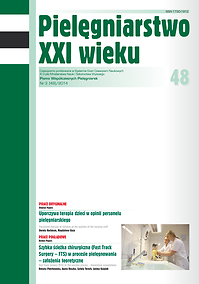Stress in parents of children hospitalized in the neonatal intensive care unit – preliminary report
Keywords:
parents, infant, Neonatal Intensive Care Unit, psychological distress, posttraumatic stress disorderAbstract
Introduction. Stress is a major concern among parents of newborns hospitalized in the Intensive Care Unit.
Material and method. The study was of a qualitative character. It used a range of research tools: The Scale of Stress PSS-10, Multidimensional Questionnaire for Measuring Coping COPE, The Impact of Events Scale-Revised IES R, Parental Stressor Scale: Neonatal Intensive Care Unit (PSS: NICU) and the Nurse Parent Support Tool (NPTS ) and author’s questionnaires containing data about parents of children hospitalized in the Neonatal Intensive Care Unit (NICU) and data on hospitalized infants. The survey involved six parents of children hospitalized in the NICU, Children’s University Hospital in Lublin. All infants were born prematurely.
Results. In all of the parents, high level of stress was detected. The most common strategies for coping with stress included: Turning to Religion, Active Coping, Planning and Seeking Institutional Support. The highest stress levels of parents of children hospitalized in the NICU were associated with the appearance of the child and therapeutic procedures used. Parents were mostly given instrumental support, and the least – emotional and evaluative support from both nurses and doctors. Post-traumatic stress disorder was found in two of the examined parents.
References
1. Juczyński Z, Ogińska-Bulik N. Skala Odczuwanego Stresu – PSS-10, [w:] Juczyński Z, Ogińska-Bulik N. Narzędzia Pomiaru Stresu i Radzenia Sobie ze Stresem. Warszawa: Pracownia Testów Psychologicznych. 2009: 11-22.
2. Juczyński Z, Ogińska-Bulik N. Wielowymiarowy Inwentarz do Pomiaru Radzenia Sobie ze Stresem – COPE, [w:] Juczyński Z, Ogińska-Bulik N. Narzędzia Pomiaru Stresu i Radzenia Sobie ze Stresem.. Warszawa: Pracownia Testów Psychologicznych. 2009: 23-43.
3. Juczyński Z, Ogińska-Bulik N. Pomiar zaburzeń po stresie traumatycznym – polska wersja Zrewidowanej Skali Wpływu Zdarzeń. Psychiatria. 2009; 6: 15-25.
4. Miles MS, Funk SG, Carlson J. Parental Stressor Scale: neonatal intensive care unit. Nurs Res. 1993; 42:148-52. http://www.ncbi.nlm.nih.gov/pubmed/8506163
5. Miles MS, Carlson J, Brunssen S. The nurse parent support tool. J Pediatr Nurs. 1999; 14: 44-50. http://www.ncbi.nlm.nih.gov/pubmed/10063248.
6. Obeidat HM, Bond EA, Callister LC. The Parental Experience of Having an Infant in the Newborn Intensive Care Unit. J Perinat Educ. 2009; 18: 23-29. http://www.ncbi.nlm.nih.gov/pmc/articles/PMC2730907/
7. Lefkowitz DS, Baxt C, Evans JR. Prevalence and correlates of posttraumatic stress and postpartum depression in parents of infants in the Neonatal Intensive Care Unit (NICU). J Clin Psychol Med Settings. 2010; 17: 230-7. http://link.springer.com/article/10.1007%2Fs10880-010-9202-7
8. Cleveland LM Parenting in the neonatal intensive care unit. J Obstet Gynecol Neonatal Nurs. 2008; 37: 666-91. http://onlinelibrary.wiley.com/doi/10.1111/j.1552-6909.2008.00288.x/abstract;jsessionid=E2C9819298828A1E8A0FD0D87B0D7462.d03t03
9. Dudek-Shriber L. Parent stress in the neonatal intensive care unit and the influence of parentand infant characteristics. Am J Occup Ther. 2004; 58: 509-20. http://ajot.aotapress.net/content/58/5/509.full.pdf+html
10. Carvalho AE, Linhares MB, Padovani FH et al. Anxiety and depression in mothers of preterm infants and psychological intervention during hospitalization in neonatal ICU. Span J Psychol. 2009;12: 61-70.
11. Borimnejad L, Mehrnoosh N, Fatemi NS et al. Impacts of creating opportunities for parent empowerment on maternal stress: A quasi-experimental study. Iran J Nurs Midwifery Res. 2013;18(3):218-221.
12. Łuczak-Wawrzyniak J. Matka wcześniaka – sytuacja psychologiczna i społeczna w trakcie pobytu dziecka w szpitalu i po opuszczeniu oddziału noworodkowego. Gin Prakt. 2009;1: 7-8.
13. Łuczak-Wawrzyniak J, Czarnecka M, Konofalska N i wsp. Koncepcja opieki nad wcześniakiem lub (i) dzieckiem chorym – pacjentem Oddziału Intensywnej Terapii Noworodka i jego rodzicami. Perinatologia, Neonatologia i Ginekologia. 2010; 3 (1): 63-67.
14. Parker JDA, Endler NS. Coping with coping assessment: A critical review. European Journal of Personality. 1992; 6 (5): 321-344.
15. Mackley AB, Locke RG, Spear ML et al. Forgotten parent: NICU paternal emotional response. Adv Neonatal Care. 2010; 10: 200-3. http://www.ncbi.nlm.nih.gov/pubmed/20697219
16. Peebles-Kleiger MJ. Pediatric and neonatal intensive care hospitalization as traumatic stressor: implications for intervention. Bull Menninger Clin. 2000; 64: 257-80. http://www.ncbi.nlm.nih.gov/pubmed/10842450
17. Joseph RA, Mackley AB, Davis CG, et al. Stress in fathers of surgical neonatal intensive care unit babies. Adv Neonatal Care. 2007; 7: 321-5. http://www.unboundmedicine.com/washingtonmanual/ub/citation/18097216/Stress_in_fathers_of_surgical_neonatal_intensive_care_unit_babies_
Downloads
Published
Issue
Section
License
Copyright (c) 2014 Author

This work is licensed under a Creative Commons Attribution 4.0 International License.




